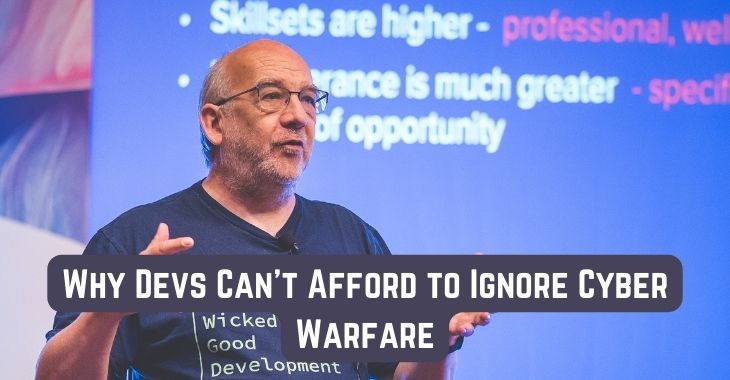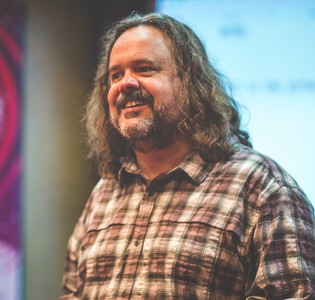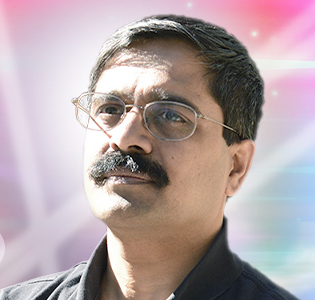
“Once again Saltmarch has knocked it out of the park with interesting speakers, engaging content and challenging ideas. No jetlag fog at all, which counts for how interesting the whole thing was."
Cybersecurity Lead, PwC

Steve Poole recently took center stage at Great International Developer Summit to dive deep into a subject that is often sidelined, yet increasingly important: cybersecurity in software development. Though his insights were aimed at the dev crowd, the ripple effects of his arguments extend way beyond any specific coding language or platform. According to Poole, we're not merely grappling with cybercrime; we're in the middle of an outright cyber warfare.
“We often think that the bad guys are too far away to pose a real threat. This complacency is a significant problem in the developer community.”
Right off the bat, Poole flipped the script on how we see cybercrime. Is it a chance-based game, akin to a stranger checking for unlocked doors? Or is it a methodically orchestrated caper, resembling that iconic bank robbery scene we've all seen in Hollywood flicks? He posited that the developer community has developed a certain detachment from these looming threats, mistakenly thinking that cybercriminals are too distant to be of real concern. The attitude, Poole, Director of Developer Advocacy at SonaType, insists, is part of the issue.
To provide further context, let's delve into the psychology of complacency among developers. Human beings have a tendency to underestimate risks that aren't immediate or visible. In the tech sphere, it's easy to assume that firewalls, SSL certificates, or other security measures are enough to keep the bad guys at bay. But Poole's assertions beg us to re-evaluate these assumptions, given that the enemy is getting both smarter and more resourced.
“If cybercrime were a country, its GDP would be the third largest in the world. These figures highlight why governments and industries are now keen to tackle this issue.”
To hit home how urgent this issue is, Poole threw out some jaw-dropping figures. Would you believe that cybercrime raked in a whopping $415 billion in 2016? That puts it on par with the global black market for narcotics. If we were to consider cybercrime as a nation, its economy would sit comfortably as the world's third largest. And that's precisely why governments and corporate sectors are sitting up and taking notice.
But what's the real-world impact of these stats? A case in point is the infamous WannaCry ransomware attack that hit over 150 countries. Public services were disrupted, from healthcare systems to transportation, and billions were lost in economic damage. If that doesn't sound the alarm bells, it's hard to imagine what will.
But wait, there's a plot twist. The types of cyber threats are undergoing a transformation. We've entered the age of cyber warfare, where well-financed pros have shifted their crosshairs to specific systems. Open-source projects, often seen as community-driven utopias, are actually soft targets. The bad actors are getting smarter, abandoning the hit-or-miss tactics and opting for a more laser-focused strategy.
Let's examine the impact on open-source communities a bit closer. Historically, the openness of these communities has been their strength, fostering innovation and collaboration. But it's becoming a double-edged sword, as it also provides an easier gateway for malicious actors to infiltrate and exploit vulnerabilities. This is particularly alarming, considering that a significant amount of today's digital infrastructure relies on open-source software.
“Many developers feel that cybersecurity is not their problem or that they wouldn't know how to address it even if they wanted to. This mindset needs to change.”
Now, what role do developers play in all this chaos? A considerable one, Poole says. It's time for the dev community to shake off the idea that cybersecurity is someone else's problem. As both users and creators of software, developers are smack dab in the middle of this security maze.
“Governments are pushing for automated systems, removing human intervention from the software supply chain as much as possible. Developers will need to adapt to new ways of working.”
And guess who else is entering the fray? Governments—especially Uncle Sam—are marching in to set new cybersecurity standards. The new mantra is automation, designed to yank human error out of the equation as far as feasible. While the intent is to secure the digital environment, it also mandates developers to recalibrate their workflow to accommodate these changes.
Let's not forget that these government interventions could also have economic ramifications. Increased compliance could mean higher development costs, potentially forcing smaller companies out of the market. It's a nuanced issue with multi-layered implications for the industry at large.
So, how can developers roll up their sleeves and get cracking? Poole offers a toolkit for action:
For those willing to go the extra mile, why not join or follow organizations dedicated to cybersecurity like the Cybersecurity and Infrastructure Security Agency (CISA) or the Center for Internet Security (CIS). Engage in forums, webinars, and seminars that enrich your understanding of the subject and offer actionable solutions.
The landscape of cyber threats has shifted gears, and developers have to shed any remnants of complacency. With regulatory forces stepping up and the stakes sky-high, there's no time like the present for devs to get serious about cybersecurity. By embracing new approaches and being proactive, not only can developers fortify their software, but they can also play their part in creating a safer digital experience for everyone.
Watch the full video of the talk, here.
Have questions or comments about this article? Reach out to us here.
Banner Image Credits: Steve Poole at Great International Developer Summit

“Once again Saltmarch has knocked it out of the park with interesting speakers, engaging content and challenging ideas. No jetlag fog at all, which counts for how interesting the whole thing was."
Cybersecurity Lead, PwC

“Very much looking forward to next year. I will be keeping my eye out for the date so I can make sure I lock it in my calendar."
Software Engineering Specialist, Intuit

“Best conference I have ever been to with lots of insights and information on next generation technologies and those that are the need of the hour."
Software Architect, GroupOn

“Happy to meet everyone who came from near and far. Glad to know you've discovered some great lessons here, and glad you joined us for all the discoveries great and small."
Web Architect & Principal Engineer, Scott Davis

“Wonderful set of conferences, well organized, fantastic speakers, and an amazingly interactive set of audience. Thanks for having me at the events!"
Founder of Agile Developer Inc., Dr. Venkat Subramaniam

“What a buzz! The events have been instrumental in bringing the whole software community together. There has been something for everyone from developers to architects to business to vendors. Thanks everyone!"
Voltaire Yap, Global Events Manager, Oracle Corp.